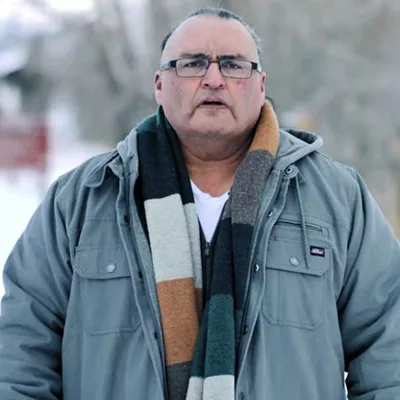It is four hours until show time, and Jeanmarie Simpson is sitting in an empty theater, reading over the script for Coming in Hot, a play that she has been working with for months.
Simpson, the sole performer in this one-woman show, writes in the margins and on separate sheets of paper, reflecting on the research and interviews she has done with the women who wrote the book that is the basis for the play.
The book, Powder: Writing by Women in the Ranks, From Vietnam to Iraq, gives women who have served in the military a forum for their stories, ranging from the difficulties they have experienced to the sights they have witnessed—and in some cases, the fun adventures they've had.
Simpson's writings also reflect the vast amount of knowledge gleaned from online sources concerning female veterans and their experiences returning home. In the silent venue, Simpson said, she also writes out certain monologues she is having trouble with, figuring out better ways to fairly and honestly represent these women.
Kore Press, the publisher of Powder, has served the Tucson community and communities across the nation since 1993. Lisa Bowden, the publisher and co-founder of Kore Press, is also the director of Coming in Hot and the co-editor of the book. The play has been performed by Simpson several times before, including shows last September at the Rhythm Industry Performance Factory.
"Kore is a nonprofit arts organization, and our mission is to publish women's writing and to help women who are underrepresented in mainstream culture," said Maddie Fearon, a spokesperson for Kore Press. "We also have a passion for social activism."
Simpson's mind is not as silent as her surroundings. Her thoughts jump to her friends in the activist community.
"My peace community isn't, generally, pleased with the project," Simpson said about Coming in Hot. "Some of those comrades have been downright offended, feeling that by giving these women a voice, I am in some way glorifying war."
The show's goal was never to further any agenda, said Fearon. The show is followed by a question-and-answer session, led by former University of Arizona professor Joanna Frueh, just for that purpose—so that people can put aside their preconceptions and judgments to discuss what the show means to them, personally.
Two hours before curtain, Simpson lays her script aside. She finds an open space and begins stretching. Yoga-like in her movements, she focuses on each individual muscle, aligning her spine, breathing.
"We didn't aim to make this a piece about anti-war sentiments," Fearon said. "It's 14 women telling their stories through Jeanmarie. It's about hearing those experiences and thinking about them."
Simpson moves to stretch her facial muscles, making one funny face after another. She warms up her voice, practicing her enunciation.
"I repeat the consonants over and over again," she said. "Enunciation is all about consonants. I breathe through the vowels."
An hour before show time, the theater is abuzz. People clad entirely in black rush around fixing stage lights and testing microphones.
Simpson finds a time to excuse herself and sets up in front of a mirror. She speaks to herself, performing pieces of the show to the mirror and trying to see the appearances of the various women she represents.
"When it premiered back in September, we had a variety of feedback," Fearon said. "People were upset that it wasn't more anti-war. Even people who were expecting war propaganda were surprised that it wasn't just information being forced upon them, but rather, a discussion."
When the show's violist, Vicki Brown, enters the dressing room, the two women sit, facing each other. First, Simpson does Brown's makeup. As she applies blush to her friend's face, the women share with each other reminders about the show—new insights.
After they are both ready, Simpson changes into a costume. The minutes before the show melt away until Simpson stands in the wings of the theater, just offstage, hearing her own breath and heartbeat, listening for her cue.
When she hears it, she steps out onto the spare stage, and speaks her first line.
"So this is death. So this is a dead body. Simple ..."







